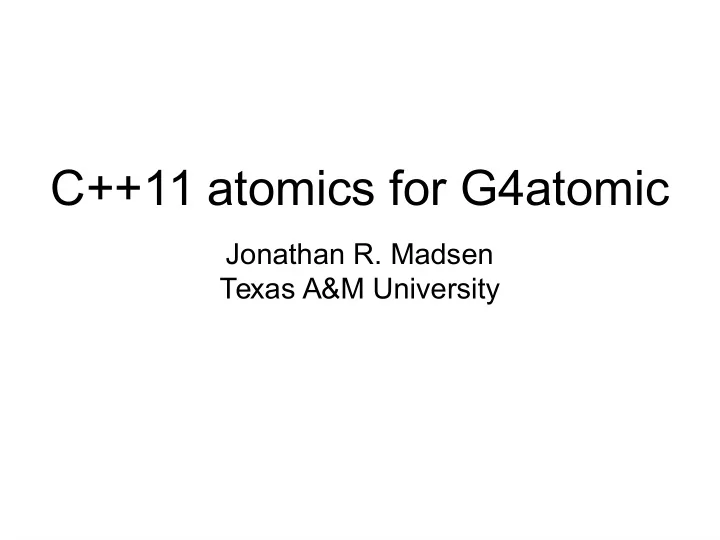

C++11 atomics for G4atomic Jonathan R. Madsen Texas A&M University
What is an atomic? We may need to consider a different alias given the nature of • our field... G4tspod (thread-safe plain-old data) An atomic is a special case of operating on plain-old data (POD) types in • a thread-safe way Depending on the hardware and compiler, in an atomic operation, the • POD will be updated in a lock-free operation, otherwise an atomic operation reduces to wrapping the lock and unlock of a mutex around the operation The naming originates from the original Greek meaning of the • word “atom” meaning “indivisible” The idea is that the operation on the data type is indivisible – a data race • isn't possible because read, operate, and write aren't separate processes. Any change by one thread is seen “instantaneously” by all other threads May be defined at hardware level, single machine instruction, • etc.
Benefits of atomics With respect to performance, an atomic will • perform, at the worst, the same as a mutex lock/unlock Otherwise, the performance gain is dependent on • the compiler/hardware but can be around multiple times faster than a mutex lock/unlock Depending on the implementation, leads to • much cleaner code → essentially, the operation statement can reduce to looking exactly like an equivalent operation on a POD type
Benefits of atomics • Easy implementation of thread-safety for non-advanced users • When data is accumulated per-event and passed at end of event to the run, the overhead of synchronization (either via atomic operations or mutexes) is *generally* very minimal and *generally* not a concern for non-HPC users • Easily implement thread-safe "counters" • E.g. recording the number of events that have been completed via a counter in EndOfEventAction, not by looking at the EventID (since EventID = 5000 does not mean events have been fjnished) • May seem trivial but it is relevant for checkpoint fjles and intermediate outputs
C++11 atomic implementation Neither an assignment operator nor copy-constructor • Atomicity cannot be guaranteed when the atomic is not lock- • free (i.e. mutex cannot be copied) This makes atomics incompatible with most STL containers • (vector, deque, list, stack, etc... any container that copies values when added to) Overloads +=, ++, -=, -- operators for integral types • Does not natively overload operators for floating-point types • Two main operations for anything else: fetch-and-store • and compare-and-swap
Fetch-and-store Primary operation for assignment • store(…) • Essentially, the operation is exactly like it • sounds: fetch the address and store the value provided in the function parameter at that address However, unlike regular POD types, the address • cannot be loaded into another core's cache after the fetch and before the store
Compare-and-swap The Swiss-army knife of the atomic • implementation – the member function takes a minimum of 2 parameters: the expected value and the desired value If the value of the atomic is the expected value, the • value of the atomic is swapped out with the desired value compare_exchange_strong(...) and • compare_exchange_weak(...) Return boolean for success • Weak variant can give better performance in highly- • contested data
Memory Ordering • Memory ordering specifications (parameters for FS and CAS function calls) are used to ensure updates happen a certain way • default memory order is sequentially consistent (seq_cst) • 6 types: • memory_order_seq_cst (read-write-modify operation) • memory_order_acq_rel (read-write-modify operation) • memory_order_release (load operation) • memory_order_acquire (load operation) • memory_order_consume (load operation) • memory_order_relaxed (no ordering constraints) • Only ensure atomicity • See here for detailed description
Additional atomic functions Getting value of atomic: load() • e.g. atomic<double> → double • double example() { atomic<double> a; a.fetch_and_store(4); return a.load(); } Checking if atomic is lock-free: is_lock_free() •
Proposal for G4atomic Create G4atomic template class • Define assignment operator and copy-constructor • (issue compiler warning if atomic is not lock-free?) Former would eliminate need for fetch-and-store outside • of class and latter would make the atomic class compatible with STL containers Define arithmetic operations for floating-point POD • types using compare-and-swap under the hood Arithmetic operation statements on atomic would reduce • exactly to equivalent arithmetic operation statements for POD
Proposal for G4atomic • Recommend for data accumulation in non-highly contested situations • use G4Parameter in those cases, e.g. thread-global value in G4SteppingAction • Recommend for beginners or intermediate users with less CS experience/background who want to utilize multithreading but are less concerned with high- performance -- optimization should be only considered after development is working for these users • Recommend using pure atomics when memory ordering is crucial or creating additional G4atomic-type class with more control over memory ordering
G4atomic vs. G4Parameter • G4atomic • G4Parameter • easiest to use • extra requirements • slower • G4ParameterManager, • Register value with • more defined operators manager • POD-only • Possible call to merge • no thread-local values • POD-only? • thread-local values (faster) • User-defined operations beyond + and *
Implementing the proposal I've already done it • examples/extended/parallel/ThreadsafeContainers • This is a fully-compatible version for C++98, C++0x, and • C++11 – much more complicated than what we need with the transition to C++11 (if C++11 is not available, it looks for Boost atomics or TBB atomics, and if neither are available, implements a mutex system) examples/basic/B1 (maybe B1a?) • Discussing with Ivana who also proposed G4Parameters •
Recommend
More recommend